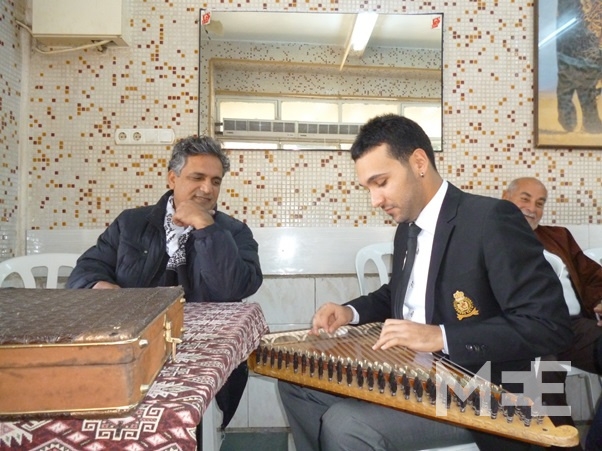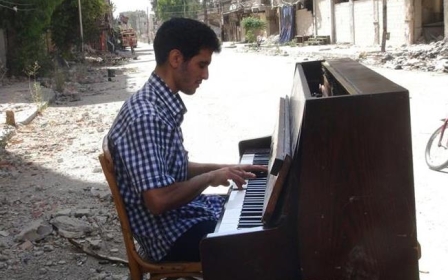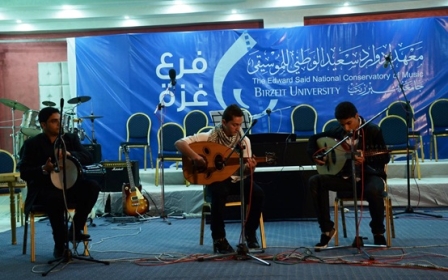Turkey's Roma defying prejudice with the aid of Mozart

IZMIR, Turkey - Imagine walking through one of the country’s most notorious and impoverished neighbourhoods reputed for illicit activities such as drug dealing - where even hardened taxi drivers refuse to go - and then suddenly hearing strains of Mozart emanate from a roadside coffee house.
This is exactly what Hamdi Akatay experienced one day around two years ago when he came to visit his mother in Izmir’s Tepecik neighbourhood, populated by Roma.
Akatay, 52, a Roma and one of Turkey’s most renowned percussionists, was mesmerised by what he heard. Strains of Mozart mingling with the sounds of traditional Roma instruments such as the Darbuka and Clarinet being played by others in another part of the coffee house.
“It had been a pet dream of mine for years to fuse classical Western music with Roma and other music forms of the East but I could never get anyone to buy into the idea. And here, in my own neighbourhood, all of a sudden I see this group of kids inadvertently producing exactly that,” Akatay said.
After a brief conversation with the kids, Akatay immediately decided to move back to his childhood home on the western shores of Turkey after 35 years - and with that the Tepecik Philharmonic Orchestra was born.
A strong believer in the theory that the best musical education is gained through a teacher-apprentice relationship, Akatay decided to become a mentor to interested kids in Tepecik and to use his fame to try create opportunities for them.
“I am a primary school dropout and learned my trade by being an apprentice to musicians playing nightclubs in the seedier areas of Izmir’s Basmane district. This taught me all different forms of the Darbuka whether played as part of the classical Turkish fasil, arabesque [Arabic-style Turkish music], Indian or just Western pop.”
While many Roma appear to have an instinctive feel and love for music it rarely extends to classical Western musical instruments.
There is no clear estimate of the number of Roma in Turkey but a vast discrepancy exists between official figures, which say there are some 500,000 Roma, and other estimates that say there could be as many as five million out of Turkey’s 75 million-strong population.
The Roma have faced a long history of social ostracism in Turkey where they are often perceived as second-class citizens and accused of being troublemakers and criminals.
Although Roma in Turkey speak Turkish and are mostly adherents of mainstream Sunni Islam, their lifestyle has meant that they are often viewed as outsiders.
Puppy love leads to interest in formal classical music
The sudden popularity with which classical music took off in Tepecik is perhaps down to 18-year-old Emre Senyaylar. The 18-year-old is a student at the state music conservatory in Izmir, where entry requirements are stringent and only the most talented gain admission. His success story is now helping to influence many other children from low-income families to try and follow in his footsteps.
Emre’s father, Muzaffer Senyaylar a professional musician himself who plays the Kanun (a string instrument), believes he is the reason Emre has opted for a career in music and chose the violin as his main instrument.
“I have recalled the story of my youth countless times to Emre. I told him about my dreams of becoming a professional footballer and how my father strongly objected," said Senyaylar. "In protest I started working at a car repair shop and lost part of a finger in a work accident. Then I had no choice but to become a musician as a way of life.”
“I told Emre it is our family tradition and music is the best career for all of us,” he said.
Although Emre, 18, does not deny this, he has a slightly different account about how his love affair with the violin and classical music began.
“When I was in the fifth grade, there was this really pretty girl in my class who I had a crush on. Her mother was a teacher at our school and had arranged private violin lessons for her,” Emre said. “Of course all of a sudden I wanted to learn the violin as well and managed to convince her mum to include me in those lessons.”
Emre has long since lost contact with the girl and her mother, who was posted to teach somewhere else in the country, but says it was the start of a journey that first helped influence him and many others since.
Why Mozart?
Akatay’s fame has helped to open a few doors for the group, but prevalent prejudices and generalisations about the Roma, and particularly those from Tepecik - which dictate that they are good-for-nothing, lazy criminals - have seriously hampered efforts to find financial support.
“Tepecik has about 32,000 residents, making it one of the biggest Roma communities anywhere in the world, and not all of them are bad. It is difficult to change such perceptions though,” said Akatay. “Even music agents and others in the business that I have worked with for years become evasive when I mention the Tepecik Philharmonic Orchestra.”
“We have faced such prejudices for generations and this was also the reason we decided to hit back at such labelling by using one of the most famous names of pure classical music,” said Akatay.
Osman Gungordu, 17, who plays the cello and also attends the Izmir State Conservatory, says some teachers at the conservatory also direct barbs at the Roma, while never being openly hostile.
“We are occasionally told that we have to abandon our Roma instruments and music if we don’t want our technique to be impaired and that Western classical music is the purest form of music,” said Gungordu. “I don’t believe that at all. I can’t even see how that is possible.”
Akatay says there are plenty of purists who look at their work with utter contempt and disdain, calling their merging of eastern and western music an abomination.
“Our response is simple. Music is universal and our ability to merge and combine different forms just adds extra richness to the music,” said Akatay.
“We can play the instruments you play but can you play our instruments is what I retort with most of them. Instead of trying to denigrate us they should think of why they completely abandon their own rich traditions. Music in all forms is for enjoyment.”
Aiming high despite limited support
Presently the group has no fixed venue to practise and they meet up at various coffee houses in Tepecik and sometimes at Akatay’s mother’s house. The upside to this has been the interest their style of music has aroused in the neighbourhood kids.
“We often have groups of eight to 10-year-olds following us and trying to join in while we practice. This is great because it means some of them will be members of our philharmonic orchestra in the future,” Emre said.
Akatay says it shows the kids that there are options other than drug dealing and crime.
“My dream is to one day set up a Roma music conservatory here in Tepecik where we can train future generations of Roma, and also others who are interested in learning about our musical heritage.”
“At the moment we don’t even have enough members to make up what would constitute a real philharmonic orchestra. Our group numbers vary from around nine to 12. And we have no girls in the group at the moment. Hopefully we will address all this in time,” said Akatay.
The big concert
In a bittersweet development, local authorities recently told Tepecik residents that they can use a historically listed building in the heart of the neighbourhood for their musical activities on the condition that they finance the restoration of the badly dilapidated building themselves.
The trouble is financing the restoration of the majestic “Liverpool House,” a building that belonged to the British in Ottoman times, that needs the sort of money no one in Tepecik has.
Regardless of the prejudices they face and the difficulty in finding sponsors, members of the Tepecik Philharmonic Orchestra are aiming high and are scheduled to play their first major gig on 10 December at Istanbul’s famed musical venue Babylon.
Mustafa Kilikisdar, 22, who plays the Kanun and also makes a living by playing professionally at various events, sees that performance as the litmus test for the orchestra.
“If we are a success at Babylon, we will be on our way. I don’t want to think of the consequences if our performance is not a hit.”
For this group of young kids, who are led by Akatay and are all fiercely proud of their Roma heritage and their neighbourhood Tepecik, the Babylon performance is just the first step. They plan to record a studio album after that to introduce their merging of Mozart symphonies with Roma music to a wider audience. Some have even grander ambitions, and talk is that one day this group will make its mark on the international stage, playing in iconic venues like the Sydney Opera House.
New MEE newsletter: Jerusalem Dispatch
Sign up to get the latest insights and analysis on Israel-Palestine, alongside Turkey Unpacked and other MEE newsletters
Middle East Eye delivers independent and unrivalled coverage and analysis of the Middle East, North Africa and beyond. To learn more about republishing this content and the associated fees, please fill out this form. More about MEE can be found here.






